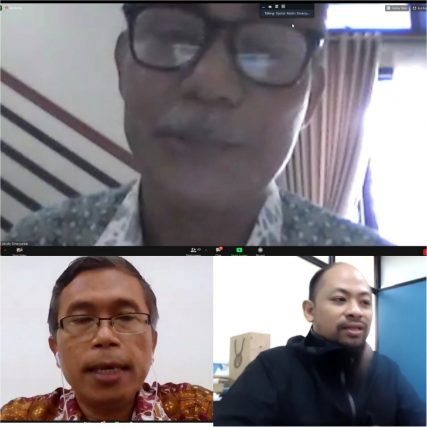Special Webinar LD FEB UI 56 Years: CSR between Company Obligations and Needs, Discussion on CSR Implementation in Indonesia
Nino Eka Putra ~ PR of FEB UI
DEPOK – (11/8/2020) In commemoration of the 56th Anniversary of the Demographic Institute, the Faculty of Economics and Business, Universitas Indonesia (LD FEB UI) held a special webinar in collaboration with the Development Studies Forum (FKP), entitled “CSR: Between Obligations and Company Needs, Discussion on the Implementation of CSR in Indonesia “on Tuesday (11/8/2020).
The resource person for this webinar is Dr. Djainal Abidin Simanjuntak, Senior Researcher LD FEB UI, moderated by Nur Hadi Wijono, Researcher LD FEB UI. This event was convened by Dr. Paksi C.K. Walandouw, Deputy Head of Research LD FEB UI.
Djainal Abidin Simanjuntak, explained that Corporate Social Responsibility (CSR) is the responsibility of a company to all its stakeholders, including consumers, employees, shareholders, communities / communities and the environment in all aspects of company operations which include economic , social, and environmental. Meanwhile, the World Bank CSR definition is a business commitment to contribute to sustainable economic development, working with employees and local communities as well as the wider community to improve the quality of business life and development.

The polemic of implementing CSR shows that it is a voluntary practice in many countries, burdens company costs, reduces shareholder profits, and disrupts the investment climate, and categorizes CSR as only a juridical or ethical obligation of companies. Business people and academics assume that CSR is not the same as corporate social and environmental responsibility (TJSL). TJSL is an obligation that must be implemented because of the mandate of the law.
In general, the implementation of CSR is not mandatory but voluntary, so its implementation must be based on the willingness, commitment, and capability of economic resources and business strategies. “CSR is a necessity and becomes a business strategy to strengthen business foundations, face market competition, reduce stakeholder pressure, minimize social and market risks, and strengthen the basic pillars of business,” added Djainal Abidin.
He continued, the concept of TJSL in the Limited Liability Company (PT) Law is budgeted and calculated as company costs, there are legal sanctions for companies that do not implement or violate it, information on its implementation is presented in the annual report of the board of directors at the General Meeting of Shareholders (GMS), and is regulated in UU (Laws) and PP (Presidential Decree). Meanwhile, the concept of CSR internationally depends on the commitment and capability of company resources, there are no legal sanctions for those who do not implement it, the information can be presented in the annual report of the board of directors / other reporting media, and is not specifically regulated in law but is an appeal to the company.
CSR practices in Indonesia are regulated in Law Number 40 of 2007 concerning PT (LLC) in Article 74 concerning TJSL, mandating that company business activities in the field of or related to natural resources are required to carry out social and environmental responsibility. PP Number 47 of 2012 Article 2 states that every company as a legal entity has TJSL, Law Number 19 Year 2003 concerning BUMN (SOE) in Article 88 paragraph 1 mandates that SOEs can set aside a portion of its net profit for the purposes of fostering small businesses / cooperatives as well as fostering communities around BUMN, Law Number 25 of 2007 concerning Investment, Law Number 22 of 2001 concerning Oil and Natural Gas, Law Number 4 of 2009 concerning Mineral and Coal Mining, and Law Number 13 of 2011 concerning Management of the Poor.
“Meanwhile, for CSR practices in Indonesia, in its implementation companies carry out CSR because of the obligations of the PT and BUMN Law. Many local governments do not understand CSR, so these regional governments issued regulations requiring all companies to carry out CSR; which burdens the company. The DPR RI (The Indonesian House of Representatives) does not yet understand the concept of CSR, so for the last 10 years it has pushed for the issuance of the CSR Law. Businesses reject the issuance of the CSR Law, so efforts to issue the CSR Law fail. Most companies in Indonesia only implement charity and not many companies include CSR as a business strategy.” explained Djainal Abidin at the end of his presentation. (hjtp)
(am)




